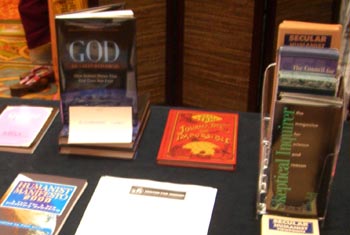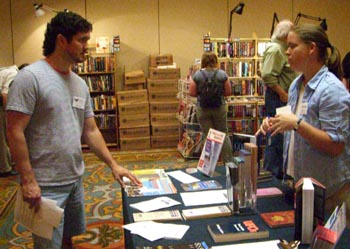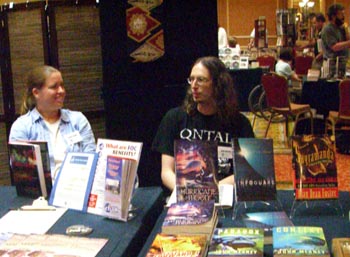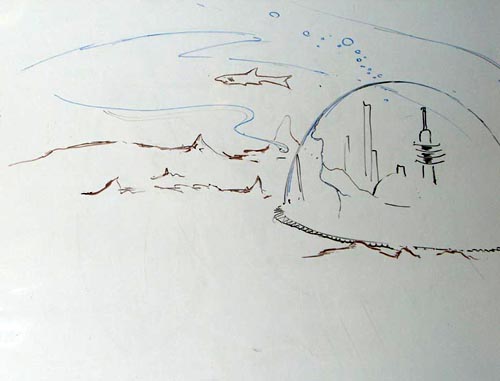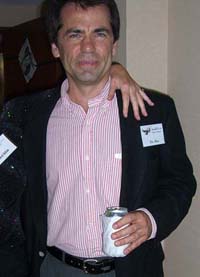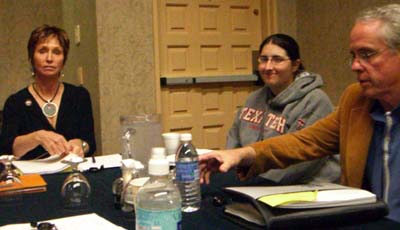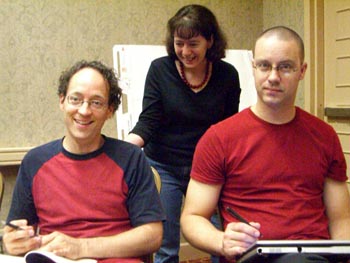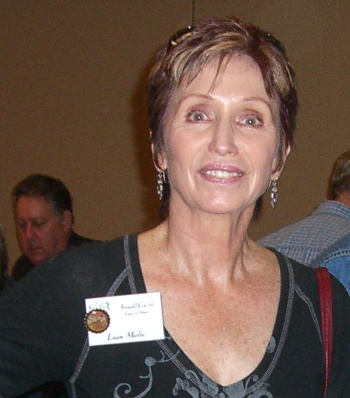I've noticed over the years that some of the "What I Should Have Read" panelists have tastes so unlike mine, it's as if we are from different planets. (It's different people each year, by the way.) For example, some people's idea of good science fiction is a Sherlock Holmes-type detective story with time travel, as you'll see further in the text. I'm sure a time-travelling Sherlock Holmes can be done very well, but... I've already read the original Sherlock Holmes, so why would I want to read the same story again? I read science fiction for something new, although it becomes increasingly harder to find. But the moment I truly realized I landed on a wrong planet came when I listed to Rick Klaw praising a comic book "I shall destroy all the civilized planets" by Flether Hanks. (More about it behind the cut). I sat there thinking, well, I'm not against weird, but I would never read SF just for that. Even the weird needs to have logic.
I found it a bit comical that while the panelists praised obscure, bizarre books like the one mentioned above, they had hardly anything to say on this year's Hugo nominees. A person in the audience asked which of this year's Hugo nominees they would recommend most highly, and Willie admitted he drew a blank on who the nominees were. Jessica Reisman corrected the situation somewhat by recommending "Blindsight" by Peter Watts.
Without further ado, here is the list of the recommended books.
Some of this year's must-read books garnered nominations from more than one panelist, and we shall start with them.
Books recommended by 2 people:
Two-handed Engine, a Henry Kuttner story collection. Joe Lansdale says: "Kuttner is one of the best SF writers, although he's a better short story writer than a novelist. The reason Kuttner still survives is because he's a damn good writer. Ideas, charcters, writing -- he's got all that."
"Thirteen" by Richard Morgan
Books recommended by 1 person:
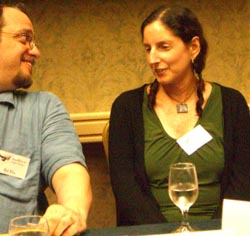
Rick Klaw and Jessica Reisman.
Here is the list of Willie's recommended science fiction books (each title is followed by Willie's short comment):
Brasyl by Ian McDonald -- In McDonald's "River Of Gods" it was India taking over the Universe, now he's doing Brazil taking over the universe.
The Prefect by Alastair Reynolds -- a quintessential space opera.
Execution Channel by Ken MacLeod -- an almost mainstream thriller that has pretty amazing stuff in it.
Mainspring by Jay Lake -- trying to imagine a world where Newtonian clockwork idea is in fact true, and where the world is composed of springs.
The Yiddish Policemen's Union by Michael Chabon -- alternate history.
Hurricane Moon by Alexis Glynn Latner
Here is the list of Willie's recommended fantasy books (each title is followed by Willie's short comment):
Un Lun Dun by China Mieville -- the villain is amazing.
Renegade's Magic by Robin Hobb -- a conclusion to her current series.
Heart Shaped Box by Joe Hill -- Stephen King's son who writes under a pseudonym.
Interworld by Neil Gaiman and Michael Reaves
Reaper's Gale by Steven Erikson
Ysabel -- Guy Gavriel Kay
Legacy -- Lois Bujold
Here are books recommended by CJ Mills. (All of these books were more than a year old.)
The Prodigal Troll by Charles Coleman Finlay
The Terrorists of Irustan and The Maquisarde by Louise Marley
Anansi Boys by Neil Gaiman
Books recommended by Joe Lansdale
Pearls from Peoria and The Best of Philip Jose Farmer: story collections by Phil Jose Farmer.
Books recommended by Jessica Reisman:
Territoryby Emma Bull -- alternative history.
Precious Dragon by Liz Williams
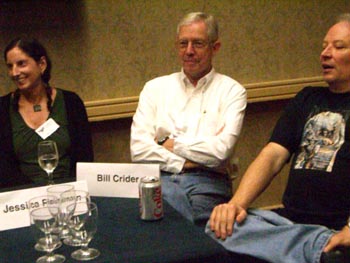
Jessica Reisman, Bill Crider and Joe Lansdale.
Books recommended by Rick Klaw:
Fast Forward 1, edited by Lou Anders -- a pretty incredible anthology. It's got an incredible Robert Charles Wilson story. There's also a story by Tony Balantyne about a world operating system, infected by a virus.
Acacia by David Durham. It's a violent fantasy with no magic. It's closer to George R. R. Martin, not to Lord of the Rings.
Michael Moorcock's detective stories -- they essentially Sherlock Holmes stories. They go to plaes you would never expect.
I Shall Destroy All the Civilized Planets: the Comics of Fletcher Hanks. Rick Klaw says: "You have these cosmic power shadow charaters who would punish people for doing the wrong things. They would freeze people's heads, they would dissect them. There is a guy there with flaming hands who goes around killing people."
Or -- and I'm not sure I got this right -- there are people who want to kill everyone on Earth except themselves, so they tie themselves to Earth and spin up the Earth so that everyone would fly off of it. The last idea sounded so absurd that I really don't know if I got it right. At that point I just sat there thinking, well... this panel is going to be less helpful to me than I hoped.
Books recommended by Bill Crider:
The Dead Fathers Club by Matt Haig -- a riff on Hamlet. A dark, but hilarious book. And if you've read Hamlet several times, you'll get a lot of in-jokes about Hamlet.
There was also a book that, in my calculation, collected 0 nominations, despite being mentioned by two people. One of the mentions was positive, the other negative, so I guess they canceled out. That was Un Lun Dun by China Mieville.
Here are more of my pictures and blog posts from ArmadilloCon 2007.
